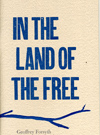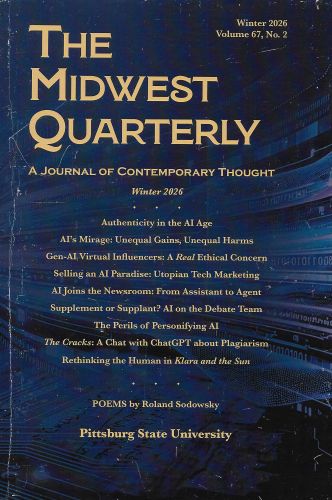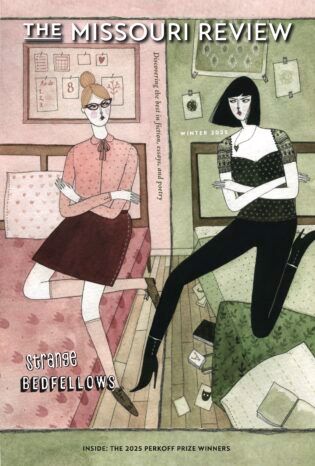When Flash Fiction was younger, you’d see it only occasionally in the neighborhood, maybe pedaling through the pages of Mid-American Review. But then something happened. Flash grew up, and got itself a diverse group of friends, with funky names like Short-Short and Postcard Fiction. Now, flash fiction is everywhere, in all of the magazines, online and in print, and we have publications devoted to the genre (SmokeLong Quarterly, Quick Fiction, flashquake, to name but a few). The next step of this maturation was natural, necessary, and finally realized: entire collections of flash fiction put out by publishers like Elixer, Calamari, Ravenna, and Rose Metal Press, who recently published Geoffrey Forsyth’s In the Land of the Free, the winner of their Second Annual Short Short Chapbook Contest. Clearly, this innovative press respects the flash fiction genre, and the idea of book as artifact. The text is an aesthetic marvel. Carefully crafted from a textured French paper, with an emerald green endpaper of Indian silk with straw, this objet d’art is something to behold. In a word: impressive.
When Flash Fiction was younger, you’d see it only occasionally in the neighborhood, maybe pedaling through the pages of Mid-American Review. But then something happened. Flash grew up, and got itself a diverse group of friends, with funky names like Short-Short and Postcard Fiction. Now, flash fiction is everywhere, in all of the magazines, online and in print, and we have publications devoted to the genre (SmokeLong Quarterly, Quick Fiction, flashquake, to name but a few). The next step of this maturation was natural, necessary, and finally realized: entire collections of flash fiction put out by publishers like Elixer, Calamari, Ravenna, and Rose Metal Press, who recently published Geoffrey Forsyth’s In the Land of the Free, the winner of their Second Annual Short Short Chapbook Contest. Clearly, this innovative press respects the flash fiction genre, and the idea of book as artifact. The text is an aesthetic marvel. Carefully crafted from a textured French paper, with an emerald green endpaper of Indian silk with straw, this objet d’art is something to behold. In a word: impressive.
Inside the covers are ten flash fictions, arranged roughly in arcing themes of birth, coming-of-age, and eventually death. All ten have appeared in literary magazines elsewhere, including such excellent periodicals as RHINO and New Orleans Review. Several have placed highly in writing competitions. For me, the works ranged in quality, from good, to very good, but all of the fictions displayed Forsyth’s varied strengths as a storyteller.
Great opening lines are a necessity of the finest short fiction, and must be able to provide what the critic Jerome Stern called, “an intrigant.” And how do you accomplish this? By absurdity: “I was born onto a cutting board in my mother’s kitchen” (“In My Mother’s Kitchen”); by conflict: “First day back at public school and Maureen Groff pulls a knife on me” (“Excalibur”); by In medias res, with a hint of sex: “Molly McGovern and I were making out in the student parking lot of our high school, getting all hot and heavy in the back of her mother’s Volvo, when . . .” (“Coins”).
You’d like to know what happens between this narrator and ol’ Molly McGovern, wouldn’t you? Trust me, you really would.
Another of Forsyth’s strengths is his ability to create immediacy in a scene, as in “Reservoir”:
My girlfriend’s mother continues to watch the news, pretending not to hear. From the kitchen come the sounds of the dogs licking their bowls clean. I am standing with Vanessa, getting ready to leave. We are looking down at her mother. “I’ll be back later,” Vanessa says to her mother, but her mother is watching the anchorman. The anchorman is watching my girlfriend’s mother. It’s a fact that allows us to leave.
Gesture, imagery, sensory description, and dialogue: the necessary ingredients of vivid fiction. Again and again, Forsyth creates these intricate moments within the larger work, these poems within the prose.
In the forward to this collection, Robert Shapard (the judge of the flash fiction contest and a fine writer in his own right) emphasizes the surreal nature of Forsyth’s stories. While I did appreciate the stories that explored several archetypes of magical realism, I actually found the strongest works to be grounded in reality. Forsyth’s attention to detail and mood enhances this realism, creating mystery – the author’s power is his ability to show our everyday lives as mystical and strange. In “Hunchbacks,” two teenagers dress for Halloween by stuffing pillows into the backs of their shirts, then get drunk on single-malt scotch and hang out in a graveyard, where “the pillows inside of the tunics made leaning on anything, even a tombstone, comfortable.” Eventually, their thoughts lead to their twin girlfriends, allowing Forsyth’s prose to elevate the odd situation into something human and strange:
He didn’t want to think of the twins with wings growing out of their backs. It reminded him of the time a bird accidentally flew into his house and bashed itself against the walls of his bedroom. He had been sleeping, so when it flew in and struck the wall the first time, he pulled the covers over his head. He lay there listening while it thumped itself to death, and when the bird dropped on his chest, even through the blanket he felt the small warm weight of it over the place where his heart was, and for a moment he thought that the dead bird was actually his heart lying there, loosened somehow and flown free of his chest.
Wow. Read that last sentence again, and understand the beauty of flash fiction: the elegiac compression of an image well wrought. This is a press and a chapbook that celebrates the genre, and a writer worthy of the form.





